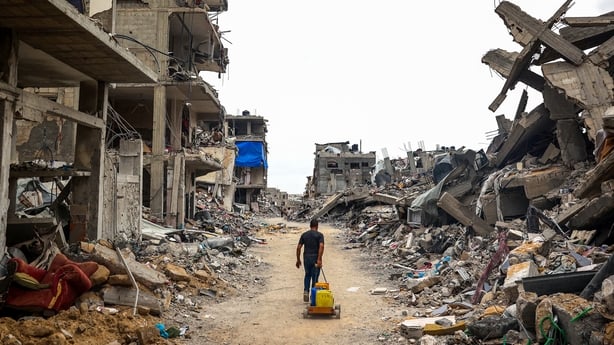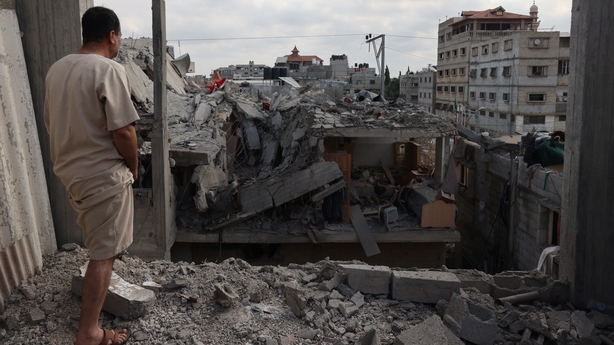Palestinian Islamist group Hamas has said that another one of the hostages abducted during its 7 October attack on Israel has died.
Hamas released a video saying that Nadav Popplewell, who was taken hostage from the southern Israeli community of Kibbutz Nirim, died after being wounded in an Israeli strike in Gaza.
The Israeli military did not offer immediate comment on the latest video.
It has referred to previous videos of hostages released by Hamas as psychological terror.
It has also denied some of the previous accusations by Hamas that hostages were killed by Israeli fire.
Earlier, Hamas released an undated video of the 51-year-old hostage in front of a white wall, with a bruise on his right eye, and speaking his name.
Hours later, in the second video, it said Mr Popplewell died of wounds sustained a month ago in an Israeli air strike.
Hamas said Mr Popplewell, whom it said was also a British citizen, was being detained with a woman hostage when the place they were being held was targeted by an Israeli missile.
"He died because he didn't receive intensive medical care at medical facilities because of the enemy's destruction of hospitals in Gaza," the Hamas armed wing spokesman, Abu Ubaida, said in a statement.
Of 252 people abducted on 7 October, 128 remain in Gaza, according to Israeli tallies.
At least 36 of them have been declared dead by an Israeli forensic committee.
Israel said securing the release of the hostages is the aim of its offensive in Gaza, along with eliminating Hamas, which has ruled the enclave since 2007.
Mr Popplewell, according to the hostage's support group, was captured with his mother from her home in Kibbutz Nirim.
His brother was killed during the attack while his mother was freed during a brief truce in November.

Meanwhile the Israeli army said about 300,000 people have left eastern Rafah for a humanitarian area since it ordered an evacuation of the southern Gaza city this week.
"So far, approximately 300,000 Gazans have moved towards the humanitarian area in Al-Mawasi" since the order was issued on Monday, the military said in a statement.
The United Nations said more than 100,000 people had fled Rafah in recent days.
The army's calls for a "temporary evacuation" were being communicated to people through leaflets, mobile text messages, phone calls and broadcasts in Arabic, its statement said.
The military ordered the evacuation of eastern Rafah on Monday as it seized control of the crossing with the Egyptian border ahead of its long-threatened ground assault in the city where some 1.4 million people are sheltering.
Earlier today the military ordered people to leave more areas in eastern Rafah and northern Gaza Strip as it pressed ahead with its fight against Hamas militants.
The evacuation orders and the army's intense bombing of eastern Rafah have raised widespread international alarm.
US strongly criticises Israel over use of weapons
The Biden administration has said that Israel's use of US-supplied weapons may have violated international humanitarian law during its military operation in Gaza, in its strongest criticism to date of Israel.
But the administration stopped short of a definitive assessment, saying that due to the chaos of the war in Gaza it could not verify specific instances where use of those weapons might have been involved in alleged breaches.
The assessment came in a 46-page unclassified State Department report to Congress required under a new National Security Memorandum (NSM) that President Joe Biden issued in early February.
The findings risk further souring ties with Israel at a time when the allies are increasingly at odds over Israel's plans to strike Rafah, a move Washington has repeatedly warned against.
The Biden administration has already put a hold on one package of arms in a major policy shift and said the US was reviewing others even as it reiterated long-term support for Israel.
The State Department's report included contradictions: It listed numerous credible reports of civilian harm and said Israel did not at first cooperate with Washington to boost humanitarian assistance to the enclave. But in each instance it said it could not make a definitive assessment whether any breaches of law had occurred.
"Given Israel's significant reliance on US-made defense articles, it is reasonable to assess that defense articles covered under NSM-20 have been used by Israeli security forces since October 7 in instances inconsistent with its IHL obligations or with established best practices for mitigating civilian harm," the State Department said in the report.
"Israel has not shared complete information to verify whether US defense articles covered under NSM-20 were specifically used in actions that have been alleged as violations of IHL or IHRL in Gaza, or in the West Bank and East Jerusalem during the period of the report," it said.
Because of that, the administration said it still finds credible Israel's assurances that it is using US weapons in accordance with international law.
Democratic Senator Chris Van Hollen said the administration had "ducked all the hard questions" and avoided looking closely at whether Israel's conduct should mean military aid is cut off.
"This report contradicts itself because it concludes that there are reasonable grounds to believe violations to international law have occurred, but at the same time that says they're not finding non-compliance," he told reporters.
More than 34,000 Palestinians have been killed in Israel's seven-month-old assault on Gaza, say health officials in the Hamas-ruled enclave. The war began when Hamas militants attacked Israel on 7 October, killing 1,200 people and abducting 252 others, of whom 133 are believed to remain in captivity in Gaza, according to Israeli tallies.

'Excessive' civilian harm
Israel's military conduct has come under increasing scrutiny with the soaring death toll and the level of devastation in Gaza.
US officials at the State Department have been divided over the issue. Reuters reported in late April that officials in at least four bureaus inside the agency have raised serious concerns over Israel's conduct in Gaza, laying out specific examples where the country might be in breach of the law.
Rights group Amnesty International in late April said US-supplied weapons provided to Israel have been used in "serious violations" of international humanitarian and human rights law, detailing specific cases of civilian deaths and injuries and examples of use of unlawful lethal force.
The US government reviewed numerous reports that raise questions about Israel’s compliance with its legal obligations and best practices for mitigating harm to civilians, the report said.
Those included Israeli strikes on civilian infrastructure, strikes in densely populated areas and others that call into question whether "expected civilian harm may have been excessive relative to the reported military objective".
According to the report released yesterday, in the period after 7 October Israel "did not fully cooperate" with US and other international efforts to get humanitarian aid into Gaza. But it said this did not amount to a breach of a US law that blocks the provision of arms to countries that restrict US humanitarian aid.
It said Israel had acted to improve aid delivery since Mr Biden warned Prime Minister Benjamin Netanyahu in a call early last month that Washington would withhold some arms supplies if the humanitarian situation did not improve.
The report, Washington has decided to declassify, said individual violations do not necessarily disprove Israel's commitment to international humanitarian law, as long as it takes steps to investigate and hold violators accountable.
"Israel's own concern about such incidents is reflected in the fact it has a number of internal investigations under way," the report said. A senior State Department official confirmed that none of those investigations had yet led to prosecutions.
It also has compiled numerous instances in which humanitarian workers have been killed and military operations had taken place in protected sites but again said it was not able to reach definitive conclusions on whether US weapons were used in these occasions.